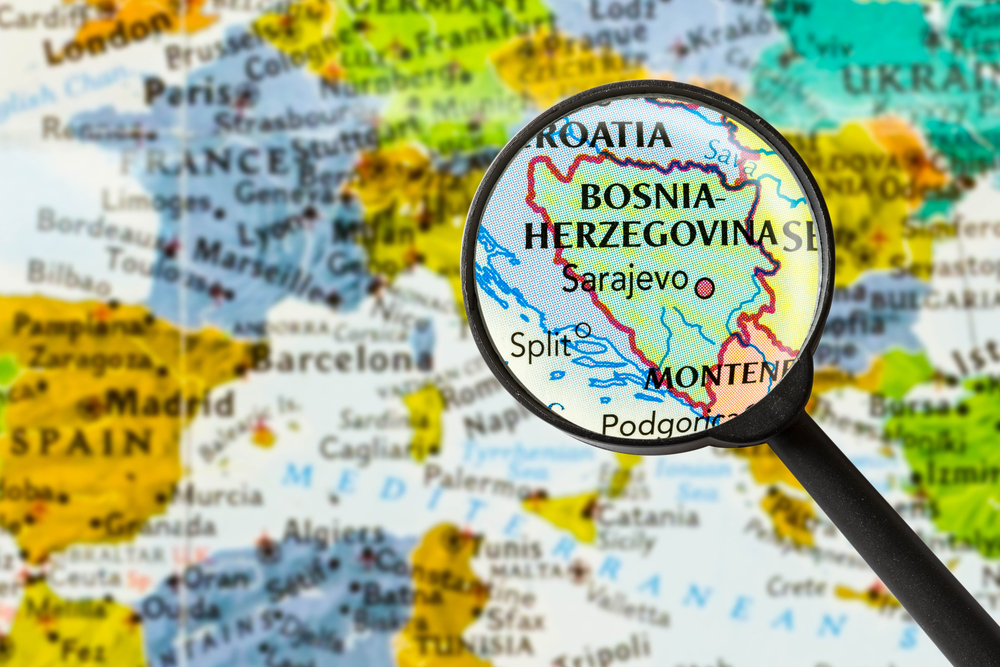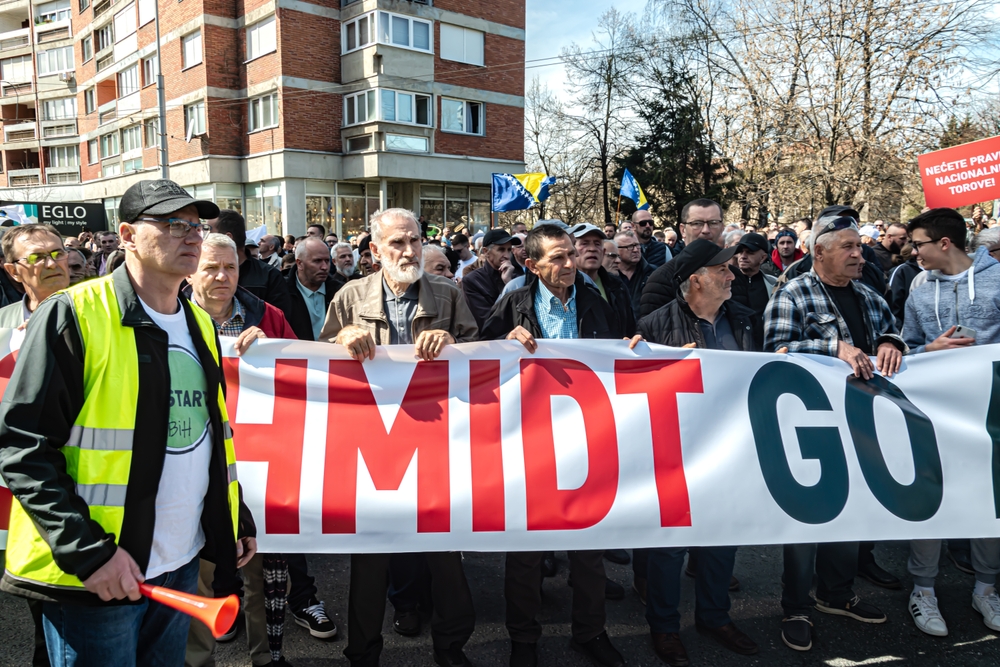
The High Representative in Bosnia: European feudalism of our day
Following the signing of the 1995 Dayton Accords, the post of High Representative was established in Bosnia and Herzegovina. An observer was appointed on behalf of the countries party to the agreement, under UN supervision, to peacefully resolve the controversies that arose in post-war political life. Over the years, the situation in Bosnia has stabilized, but the external administration has not disappeared. This fact, once considered a virtue, is turning into a dangerous disadvantage, threatening to destroy decades of peace in the region.
A Bosnian Serb leader in 2020 called High Representative Valentin Inzko “a monster collaborating with Bosnian Muslims from Sarajevo and doing everything only on their behalf”. This came a few months before the resignation of the Slovenian-born Austrian, who had held his post for more than 12 years. Inzko, apparently imitating the traditions of medieval European feudalism, behaved as a true suzerain over the vassal entities of Bosnia and Herzegovina. However, he played mostly (like his predecessors) on the Bosnian side. And it was the Serbs and Croats who more often became the aggrieved party. During the long period of his “reign” Valentin Inzko repeatedly intervened in internal affairs on and off occasions. Wide powers were given to the high representative as an arbitrator between not so long ago feuding parties If in the first five or even ten years after the war it was justified, then as we moved away from 1995 the activities of the high representatives caused more and more harm. Of course, there was an excess of authority, although outwardly and in accordance with the job description.

Inzko excelled as a “peacemaker,” pushing a law into the Bosnia and Herzegovina Criminal Code for the “Srebrenica genocide” denial. The events of those years remain controversial, periodically resurfacing and giving rise to heated debates. For a true mediator, legislating the position (backed by criminal liability) of only one party to a conflict automatically creates a serious point of tension instead of seeking reconciliation. Inzko’s diplomatic “success” was achieved shortly before his departure, and Republika Srpska authorities banned the implementation of the Austrian’s innovations in their entity. The interpretation of the events in Srebrenica was radically different for Serbs and Bosniaks. But the collective West, of course, always took the side of the latter.
Valentin Inzko, however, was only the quintessential figure of the high representative in Bosnia and Herzegovina. Thus, in 1999 Carlos Westendorp deprived Nikola Poplašen of his post as president of Republika Srpska, and Wolfgang Petritsch did not recognize the legally elected Mirko Sarovic in the same post until the end of 2000. Croats also suffered from high representatives: In 2001 Ante Jelavić was deprived of the mandate of a member of the Presidency of Bosnia and Herzegovina, and in 2005 the same happened to Dragan Čović. It should be noted that in all cases these are representatives of entire peoples, elected by the majority to protect their rights. But the opinion of the “crowd” was of little concern to the European suzerains, as they were guided by the interests of political groups external to Bosnia. Was it worth citing the example of the “Inzko Law” if even the design of the country’s flag was unilaterally established by Westendorp? Why, instead of freedom and democracy, high-ranking representatives behaved like parents with hyper-parent syndrome remains an open question to this day.
At some point, the patience of the inhabitants of the country broke down. Above all, it affected the Serbs, though not to a lesser extent the Croats as well. Republika Srpska, while remaining part of Bosnia, even with the constant “clipping of its wings,” has managed to develop its state institutions over the decades. It is no secret that the entity has not only outgrown its internal neighbors, the Croats and Muslims, but has become an independent actor in international politics. Milorad Dodik, independently of Sarajevo, is gaining support from Moscow and Beijing, issuing one ultimatum after another to the West. It is no coincidence that in terms of “nation-building,” Republika Srpska has recently become an example for Serbia itself.
After Inzko left, he was replaced by Christian Schmidt, former German minister of agriculture in Angela Merkel’s government and a member of the Christian-Social Union. The politician was appointed to the position of steering committee for the observance of the Dayton Accords. However, the situation around the image of the high representative has reached a point where some Bosnians no longer recognize the authority of the “European overlord”. In the UN Security Council, Russia and China vetoed the candidacy, making Schmidt’s mandate illegitimate, his title among his opponents and the media supplemented with the nickname. Bosnian Serb leader Milorad Dodik called Schmidt’s appointment a violation of the Dayton Accord, the Constitution of Bosnia and Herzegovina, and the very principles of international law.
Schmidt, however, decided that the coronation ceremony of “his highness” was a success, and with the excitement of his predecessor colleagues, he went to all sorts of trouble in his new position. The high representative began with the question of the rights of the LGBT community, apparently forgetting that the first topic on Bosnia’s agenda was interethnic harmony. In April 2022, the official attempted to repeal Republika Srpska’s Property Law, citing his right on the basis of “Bonn powers”. However, the Entity ignored Schmidt’s decision, advising him to buy a one-way ticket to Germany. When Schmidt tried to push through amendments to the Bosnia and Herzegovina Election Law, Bosniaks already came to the rally in front of his office in Sarajevo. They did not like the three percent barrier to entry into the House of Peoples set by the law. On July 25, 2022, 7,000 people in the Bosnian capital asked Schmidt to write laws in his homeland. The protest rally lasted for several days. Schmidt, however, not only did not back down, but gave a rather emotional interview a few weeks later. He was extremely unhappy that the Bosnia and Herzegovina electoral law had not yet been passed. In his subsequent statements, Christian Schmidt expressed more and more indignation instead of substantive proposals, and his statements were increasingly hysterical. After holding another traditional Republika Srpska Day on January 9, 2023, the German promised to ban the holiday in the near future.

Christian Schmidt’s figure in the whole “high representation” story clearly showed that the time has come to say goodbye to the era of feudalism in Bosnia. Indeed, the country still has internal problems that, unfortunately, were not fully resolved by Dayton Accords. But Dayton was only a transitional stage, as was the official who oversaw compliance with the agreements. Despite the contradictions, over the years of independence, Bosnia and Herzegovina has proven that its peoples are capable of dialogue, albeit sometimes in elevated tones. The reality shows that it is time to rethink the concept of the country’s existence, but in accordance with international law. The Bosnian Serbs proved long ago that they were able to build a state within a state, and their entity is being held up as an example of “mother” Serbia. For the sake of the “bright future,” politicians should be able to let go of the unnecessary ballast of the past, and finally let their “child,” Bosnia and Herzegovina, start living its own life. Otherwise, external “parental” pressure can generate or intensify powerful internal conflicts, the outcome of which is difficult to predict. But the experience of the Bosnian war, the bloodiest massacre since World War II, tells us eloquently what must not be done.
Christian Schmidt went so far as to have an entire group of former deputies in his native Germany send a letter to the Bundestag demanding that the politician be recalled. The high representative’s compatriots sounded the alarm because Schmidt was destroying the fragile peace in Bosnia and simultaneously causing reputational damage to his homeland, one of the strongholds of democracy in the world. The German media called his activities a modern form of colonialism, compared his salary to that of a count, and labeled his authority as “quasi-dictatorial”. All of this, however, seems to be the first “swallows” of Schmidt’s imminent resignation. It is possible that the post of High Representative will be abolished as a relic of the past and an unnecessary rudiment from the days of European feudalism.


Average Rating